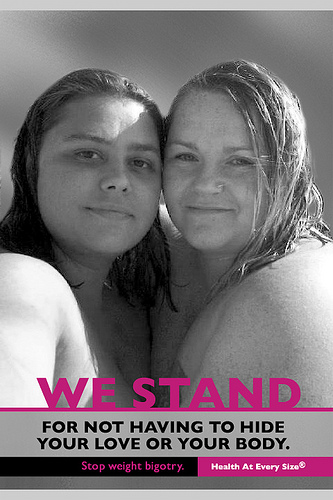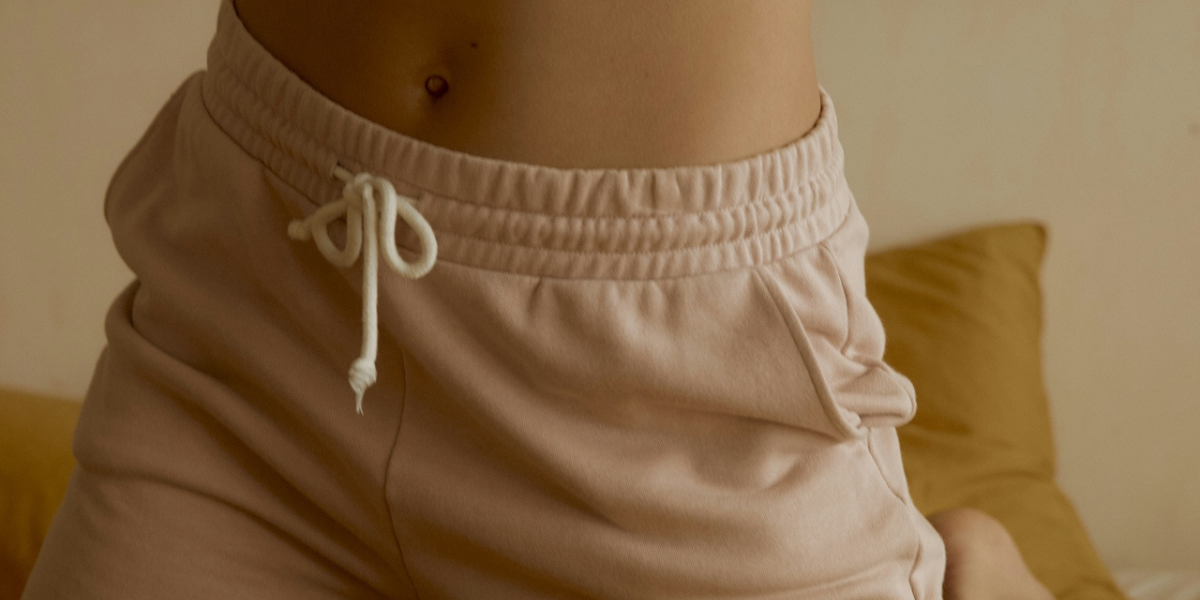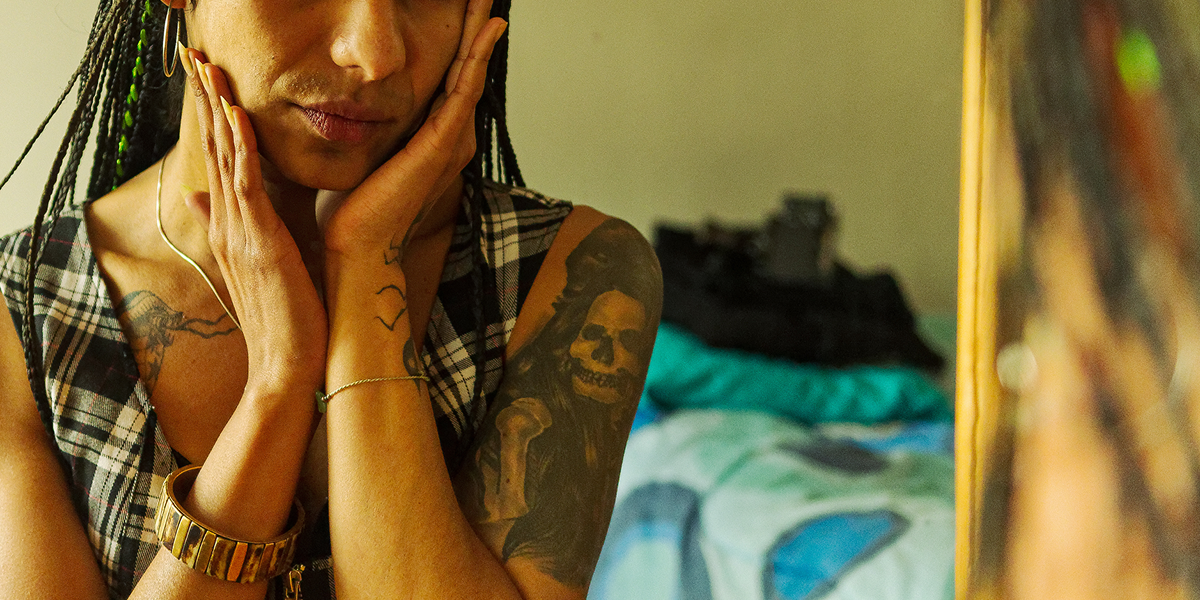by Anna Mollow

Last Wednesday, my partner and I woke up to wonderful news: DOMA and Prop 8 are defeated! After our wedding this summer, we will be legally married. It’s a time for celebration, and for inspiration.
What work still needs to be done? There are many answers, but here’s one: Fat liberation.
Social equality for all people, regardless of size, must become a goal of the queer movement.
I am a thin woman, and my partner is fat. In the seven years I’ve loved her, I’ve been struck by a contrast: While many on the left have fought for equality for LGBTQ people, fat people are experiencing more stigmatization. This trend is puzzling, because anti-fat and anti-queer oppression are so similar. Both fat folks and queer folks face violence, lack adequate protection against employment discrimination, and are often disparaged for “choosing” an “unhealthy lifestyle.”
Yes, fat people can get married, but many thin people would not consider dating, let alone loving and marrying, someone who is fat.
In my article “Sized Up: Why Fat is a Queer and Feminist Issue” for the Micro/Macro issue of Bitch, I invite feminists and queers to become allied of fat people. Many readers vehemently opposed this idea. “Sized Up” received over two hundred comments on Bitch’s website and on Facebook; the content of many of them made it clear that fat hate is still accepted in some feminist spaces.
One commenter, who described herself as a “formerly fat, now fit, lesbian,” said she was “disgusted” by “the false parallels drawn between the real systemic oppression of LGBT people… and not being able to fit your fat ass into an airplane seat.” Another wrote: “Oh, hell no, I am not living my life in the closet so [you] can eat more Doritos and whine about oppression…Put down the goddamn McDonald’s and read a fucking book.”
“Read a book” is exactly what I’d hoped that readers of my article might be willing to do. Several commenters expressed outrage at my comparison between fatphobia and homophobia—because, they insisted, fatness is “unhealthy” and “a choice.” But the science behind the medicalization of fatness is sketchy. Anyone who doubts this should check out Paul Campos’s The Diet Myth and Gina Kolata’s Rethinking Thin. These books provide comprehensive critical analyses of the medical literature on body size and health (with dozens of footnotes to peer-reviewed studies), and they demonstrate that what most Americans think they know about “the obesity epidemic” is diet-industry-funded propaganda. Many other excellent books—such as Linda Bacon’s Health at Every Size, Glenn Gaesser’s Big Fat Lies, and Laura Fraser’s Losing It—also debunk the myth of an “obesity crisis.”
Of course, I don’t expect that many people who espouse anti-fat views will actually read these books. As fat activist Marilyn Wann aptly observes in her comment on the article, anti-fat messages are about “hate, not health.” For example, one commenter wrote, “Being fat is a choice and can and should be shamed.” What makes some feminists and queers, who have been subjected to so much oppression ourselves, willing to shame others on account of their perceived “lifestyle choices”? Perhaps part of the explanation is that, as women, we have been taught that our worth lies in being “attractive,” and that “attractive” must always mean prettier—or thinner—than some other woman.
As queers, we’ve long been told there’s something wrong and disgusting about who we are; fatphobia may seem to save us from that pain by giving us a way to say that someone else is those things. But at what cost? Do we want a feminist queer movement that is lean, mean, and free of fat folks? Or do we want a movement for everyone?
Even people who earnestly want to “help” fat people often betray unexamined prejudice. For example, in a recent article in The Atlantic, David H. Freedman proposes that the “less affluent masses” of “junk-food-eating obese” may have “little cultural bias against overindulging in food, or putting on excess pounds.” To gain insight into this phenomenon, he drives to East L.A., where he observes “overweight” Latino/a children walking home from school “with a slow, waddling gait.” The confluence of racism, classism, and fatphobia here should make us hesitate before we define “obesity” as a problem in need of a solution.
While most liberals assume that poverty causes “obesity,” the converse is actually true: Widespread discrimination in employment, education, housing, and marriage places fat people at greater risk of being poor. Many employers refuse to hire fat people, believing they are lazy or likely to be too sick to show up for work. This was former White House doctor Connie Mariano’s rationale for asserting that New Jersey Governor Chris Christie was too fat to be president. “I’m worried he may have a heart attack,” she said. As a physician, Mariano probably knows that cigarettes pose much greater health dangers than fatness—so why not urge Barack Obama to resign from the White House because he smokes?
Recognizing that much BMI “science” is bogus, the American Medical Association’s Council on Science and Public Health recommended that larger-than-average body size not be designated a disease. But the AMA ignored this advice from its own committee; recently, it declared “obesity” a disease, paving the way for big profits for diet drug companies and bariatric surgeons. While the AMA claims that naming “obesity” a disease will reduce the stigmatization of fat people, Wann points out in a recent blog post that the medicalization of weight diversity has long been used to justify the practice of blaming fat people for all manner of social ills.
One example of such scapegoating is a letter to the editor of Bitch, by Cristina Richie, who claims to be “appalled” that my article “endorsed the ecologically reckless notion that obesity is a morally neutral state of being.” According to Richie, fat people’s “overconsumption” of food is a major contributor to global warming. Never mind that fat people do not necessarily consume more calories than thin people; for example, I eat almost twice as much of the exact same (local, organic, sustainably grown) food as my partner. If we intend to penalize people for eating “too much,” then we should also target professional athletes (whose caloric consumption is huge) and pregnant women (whose offspring will definitely increase our carbon footprint).
Fat hate is not just mean words on a computer screen. As a commenter with the tag “Seriously, ya’ll” writes:
I don’t get hired because of my body. I see the faces fall when the committee that had been thrilled by the resume and phone interviews and work samples meets my body. I have friends who have been attacked because of their bodies and many who were abused growing up because the monster in charge was ashamed of their bodies. Bullying fat kids is still, apparently, funny, because who gives a fuck about a fat fuck.
All this is justified, fatphobes insist, because “being fat is a choice.” In their view, the reason diets don’t work is that fat people lack the discipline to implement a “total lifestyle change.” Some confusion is understandable. Most people can exert some control over how much they weigh. For example, a thin person may decide to reduce her fat intake (a choice that will probably make her hungry, grumpy, and less healthy), and her weight may drop from 130 to 110. A fat person may do the same thing (and experience the same hunger and health risk), and her weight may fall from 280 to 260. While the thin woman will likely receive compliments for being “pretty” and “petite,” the fat woman will still be called “obese.”
Well then, the anti-fat folks say, just try harder: move more; eat less. But study after study shows that maintaining a permanent weight loss of more than twenty to thirty pounds is virtually impossible, and that fat people who attempt this have worse health outcomes than those who accept their size. Yes, some people do manage to lose 100 pounds or more, but this weight is nearly always regained within five years. There is a physiological reason for this: If your weight falls too far below your genetically determined “set point,” your body fights back, producing hormones that make you extremely hungry, and your metabolism slows dramatically.
“Being fat is a choice, and being gay is not,” respondents to my article maintained. Being fat is not a choice, but being fatphobic is—and it’s a choice I’m so glad I did not make when I began falling in love with my partner many years ago. Even if fatness were a choice, many fat people love their bodies and would not want to change them.
This week, the Supreme Court made it clear that “skim milk” marriages will not do. Neither will fat-free, or fatphobic, feminist and queer movements. After all, isn’t fat liberation what feminism and queerness are all about: loving ourselves and each other without regard for what mainstream culture defines as “normal,” “healthy,” or “beautiful?” If I had chosen not to challenge the anti-fat prejudices that I, like everyone in our culture, had been taught—if I had failed to see how gorgeous and sexy fat women can be—I would have missed out on the love of my life. Fat liberation is totally queer, and embracing this cause must be one of our movement’s next steps.
The author thanks Jane Arlene Herman, Jennifer Nicole Herman, Merri Lisa Johnson, Irwin Keller, and Alicia Michelle LeCompte for their love, support, and editorial advice.
Originally published on BitchMagazine.org. Republished WITH PERMISSION MOTHERF*CKERS.
Anna Mollow’s essays on queerness, feminism, fat politics, disability, and chronic illness have appeared or are forthcoming in Bitch, WSQ: Women’s Studies Quarterly, Social Text Online, The Journal of Literary and Cultural Disability Studies, MELUS: Multi-Ethnic Literature of the United States, and the Disability Studies Reader. She is the coeditor, with Robert McRuer, of Sex and Disability (Duke UP, 2012). Anna is a Ph.D. candidate in English at U.C. Berkeley, where she is the recipient of the Andrew Vincent White and Florence Wales White Scholarship.







